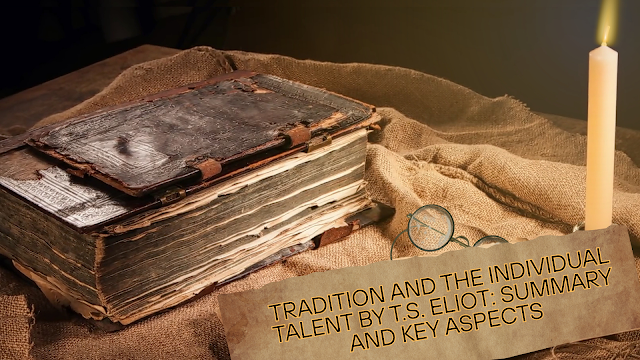Tradition and the Individual Talent by T.S. Eliot: Summary and Key Aspects
🖋️ Introduction
The essay Tradition and the Individual Talent by T.S. Eliot, published in 1919, is a key piece of literary criticism and a cornerstone of Modernist philosophy. It questions Romantic ideas of individuality and passion, contending that a great poet must write impersonally and in accordance with literary tradition.
🧾 Summary
Tradition and the Individual Talent by T.S. Eliot, published in 1919, is a classic work of contemporary literary criticism. It reframes our conception of originality and poetic creation. Eliot questions the Romantic notion that a poet's feelings are directly expressed in their poetry. Rather, he argues that poetry needs to be impersonal and molded by skill, expertise, and a profound comprehension of literary tradition.
According to Eliot, genuine originality comes from interacting with the past rather than ignoring it. By adding new meaning to existing literature and being influenced by it, a great poet joins a living tradition. Tradition is dynamic; it changes each time a new text shifts how we interpret earlier works.
The impersonal theory of poetry is another foundational concept. In order to incorporate emotions and experiences into poetry without introducing their own identities, Eliot contends that the poet must function as a scientific catalyst. Poetry is therefore a combination of thought and feeling, honed by skill and intellectual awareness, rather than a pure expression of emotion. This method transforms poetry from a form of self-expression into a timeless form of artistic expression.
📌 Key Aspects
1. A Reinterpretation of Tradition
Eliot thinks tradition is more than just reciting the same old concepts. Studying, absorbing, and reshaping the literary past is an active process. To comprehend how literature transcends generations, a poet needs to cultivate a "historical sense."
2. The Impersonal Nature of Poetry
The idea that poetry must be impersonal is one of the essay's main points. Eliot asserts that skilled poets repress their innermost feelings in order to produce poetry that speaks to everyone. The poem itself possesses emotion, not the poet's character.
3. The Catalyst Role of Poetry
Eliot uses a scientific metaphor to contrast the poet to a chemical reaction's catalyst. Thoughts and emotions are fused into art by the poet, who does not see the end result. The poem doesn't contain any of the poet's personality.
4. Combination of Feeling and Thought
According to Eliot, poetry is the ideal combination of deep emotion and sophisticated thought. Instead of relying solely on inspiration, this process calls for maturity, education, and literary discipline.
🎯 Themes
-
Innovation and Tradition: Innovation is only significant when it is grounded in tradition.
-
Impersonality in Art: Genuine art is not influenced by the creator's personal life.
-
Artistic Discipline: Poetry is a skill that requires training and intelligence.
-
Critique of Romanticism: Eliot disagrees with the Romantic poets' individualism and emotional excess.
🧵 Conclusion
Tradition and the Individual Talent is still regarded as one of Eliot's most important pieces. Tradition, impersonality, and intellectual control over impulsive emotion are all emphasized, providing a revolutionary perspective on poetic creation. Eliot's theories inspired poets to see their writing as a part of a vast, changing tradition rather than a private journal of emotions, which changed the face of modern literature.
[Tags: TS Eliot, Modernism, Literary Theory, Poetry, Tradition in Literature]




Comments
Post a Comment